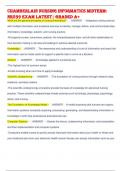CHAMBERLAIN NuRsINg INfoRMAtICs MIdtERM:
NR599 EXAM LAtEst| gRAdEd A+
What are the general principles of nursing informatics? - ANSWER -Integrates nursing science
with multiple information and analytical sciences to identify, manage, define, and communicate data,
information, knowledge, wisdom, and nursing practice
-NI supports nurses, consumers, patients, the interprofessional team, and all other stakeholders in
their decision making in all roles and settings to achieve desired outcomes
Knowledge - ANSWER The awareness and understanding of a set of information and ways that
information can be made useful to support a specific task or arrive at a decision
Wisdom - ANSWER -Knowledge applied in a practical way
-The highest form of common sense
-Entails knowing when and how to apply knowledge
Scientific Underpinning - ANSWER -The foundation of nursing science through research data,
evidence, and idea creation
-The scientific underpinnings of practice provide the basis of knowledge for advanced nursing
practice. These scientific underpinnings include sciences such as biology, physiology, psychology,
ethics, and nursing.
The Foundation of Knowledge Model - ANSWER A model proposing that humans are organic
information systems constantly acquiring, processing, generating, and disseminating information or
knowledge in both their professional and personal lives
Computer Science - ANSWER -Studies the theory, underpinning information, and computation
and their implementation and computer systems
-Computers enable nurses to quickly access important information about your health or illness and
your treatment plan from your electronic health record. Nurses can access information such as your
, CHAMBERLAIN NuRsINg INfoRMAtICs MIdtERM:
NR599 EXAM LAtEst| gRAdEd A+
laboratory test and x-ray results and health reports from other health-care team members to give you
the best care possible.
Cognitive Science - ANSWER -How the human mind works from an information processing
perspective
-Cognitive science is the interdisciplinary, scientific study of the mind and its processes. It examines
the nature, the tasks, and the functions of cognition (in a broad sense). Cognitive scientists study
intelligence and behavior, with a focus on how nervous systems represent, process, and transform
information.
Information Science - ANSWER -The retrieval and management of information, as well as
human computer interaction
-Information science is an academic field which is primarily concerned with analysis, collection,
classification, manipulation, storage, retrieval, movement, dissemination, and protection of
information.
Standard Terminology - ANSWER Structured, controlled languages developed to represent
concepts in a given domain in a clear fashion that conveys the exact same meaning for data,
information, and knowledge across settings, regions, and even different countries
Why is standard terminology important? - ANSWER -Contribute to the development of
knowledge because they ensure that all professionals share the same understanding or meaning of a
given concept;
-Key to development of EHRs
-Support the collection of data that provide more information which could increase patient outcomes
and decrease health care costs




